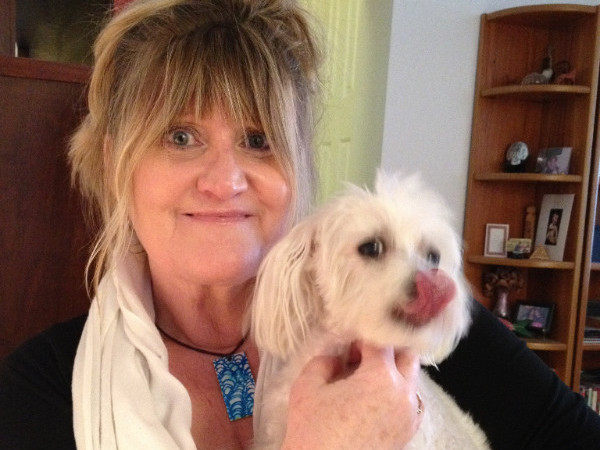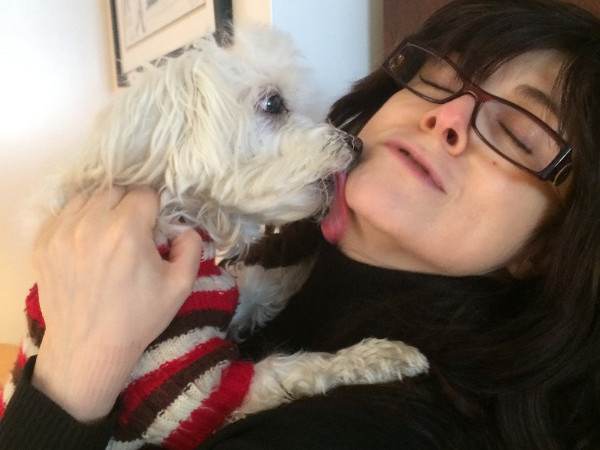« previous post | next post »
Amy Stoller is a dialect coach operating out of New York City, known among many other things for her work with Anna Deavere Smith.
This valuable advice is from her November newsletter — reprinted with permission.
|
DEAR RICKY THE DIALECT DOG: How can I learn to roll my R's?
DEAR READER: Do a thorough tongue warm-up every day, to build strength and flexibility. A strong, flexible tongue is the first step to mastering a new lingual consonant skill.
|
|
1. Relax your jaw with a gentle yawn.
|
 |
|
2. Touch your nose with your tongue.
|
3. Touch your chin with your tongue.
|
 |
 |
| 4. Swipe your tongue around your face in a circular motion, then reverse direction. |
5. Be happy you did such a great warm-up! |
 |
 |
|
6. DON'T FORGET TO LICK YOUR FRIENDS!
(That's the best part.)
|
 |
 |
November 7, 2016 @ 12:13 am
· Filed by Mark Liberman under Dialects
Permalink







Laura Morland said,
November 7, 2016 @ 12:29 am
The silliest post I've ever seen on LL, but a bit of levity 48 hours before the polls close in California is likely what we all need at the moment.
David Marjanović said,
November 7, 2016 @ 1:26 am
Iä! Iä!
Amy Stoller said,
November 7, 2016 @ 7:50 am
Laura, my bent toward silliness and Ricky the Dialect Dog have turned out to be among the greatest assets in my practice. If it made you smile, my work here is done. Ricky agrees.
S Frankel said,
November 7, 2016 @ 11:04 am
gecko addition: lick your eyeballs
Amy Stoller said,
November 7, 2016 @ 1:46 pm
S Frankel, thanks for the laugh. What an image!
David L said,
November 7, 2016 @ 2:30 pm
I have a highly scientific question: is there any correlation, positive or negative, between being able to roll your tongue (I can) and roll your R's (I can't)?
Since I was born in England, it's possible I just don't have the R-rolling gene.
Jamie said,
November 7, 2016 @ 3:45 pm
@David L: I don't think so.
As a second data point, I can also roll my tongue and can do a reasonably good Spanish, Italian, Japanese and French R. (Oddly, although an English speaker, I articulate R rather oddly in English.)
Laura Morland said,
November 7, 2016 @ 4:14 pm
@Amy Stoller, In no way was my criticism directed towards YOU. I am, in fact, chagrined that you read my comment.
It's just that I've been following LL faithfully for a while now, and aside from a couple of "politically-oriented" posts, the publications have always been useful, or at least informative. Outside the New York Times, I've stopped reading nearly everything else on the Internet these days, but I nearly always peruse Language Log. So I was frankly disappointed to open this post and not learn something new to me, especially since I've been told I could use some help with my dialects.
(The only ones I can reasonably do are Southern — because I used to have a genuine Southern accent — and French, since I lived in Paris for ten years. Any attempt on my part to imitate a New York, Boston, English or Irish, etc., accent is met with justifiable derision.)
Alon Lischinsky said,
November 7, 2016 @ 5:22 pm
@David L: up to 35% of the human race (depending on which study you follow) can't roll their tongue. If doing that were a prerequisite for pronouncing /r/ (the alveolar trill consonant often called rolled R), it would be very odd for that phoneme to be a standard part of any language's inventory.
Jerry Friedman said,
November 7, 2016 @ 5:30 pm
Are there any numbers on the people who can't roll their R's?
Laura Morland said,
November 7, 2016 @ 7:26 pm
@ Jerry Friedman
I'm convinced that ANYONE with a normal tongue (ability to "roll" it irrelevant) and SUFFICIENT MOTIVATION could learn to produce "the alveolar trill consonant often called rolled R."
Taking myself as a case in point, I took Spanish lessons at age 7 (the overnight Cuban diaspora caused a temporary surfeit of Spanish teachers in Florida in the early 60s) and so at that young age, I mastered it easily and have never lost the trick.
However, at age 45 I moved to France and eventually mastered the French /ʀ/, which is arguably much more difficult from the Spanish /r/. Truth be told, I at first felt that it was such a ridiculous consonant that for a few years I didn't even try. Then one day an acquaintance said, "votre r ne resemble pas à nôtre" (your r doesn't sound like ours), and I "heard" myself from the French point of view for the first time. I started practicing, and finally I was able to produce a sound that is about 90% "accurate" by Parisian French standards.
So… if I could master the /ʀ/ at my relatively advanced age, anyone can master the /r/!
Therefore I don't see how any statistics could exist on the number of persons who can or cannot produce the /r/. It's not a genetic or physiological condition.
David P said,
November 7, 2016 @ 9:07 pm
@Laura Morland: What is a "normal tongue"? I'm another data point: I can roll my tongue but can't trill r's, as I discovered when we moved to Sweden from the U.S. when I was 9. It wasn't for lack of trying or lack of motivation. My mother told me when I was older that I was born with "tongue-tie" (ankylglossia) and had had my frenulum snipped as a new born. The procedure was supposedly successful, but I wouldn't be surprised if my inability to trill is somehow connected to the newborn tongue tie.
D.O. said,
November 7, 2016 @ 9:57 pm
Alveolar trill is a part of Russian sound inventory. It is usually the last sound that children learn to pronounce correctly, sometimes several years after saying everything else almost right. And some native Russian speakers never master it. Most famous example was Lenin.
Laura Morland said,
November 7, 2016 @ 11:07 pm
@David P, I meant a tongues not impaired by any "condition"… and maybe yours qualifies? For pparently your mother is not the only one to blame ankylglossia on the inability to produce a certain sound:
https://www.quora.com/Is-there-a-genetic-or-physiological-reason-to-account-for-why-some-people-cant-produce-a-rolled-trilled-r-as-in-Spanish-or-Italian
Joe said,
November 8, 2016 @ 3:41 am
Laura, my wife is Spanish, lived in Spain into adulthood, and has never been able to do an alveolar trill. She makes do with a uvular trill instead. No other speech problems.
S Frankel said,
November 8, 2016 @ 7:57 am
Substitution of a uvular for an alveolar trill is a reported speech defect in several languages – I've heard of it in Romanian and Welsh (where it's called "tafod tew" ="thick tongue"). Don't know how common it is.
Rodger C said,
November 8, 2016 @ 8:02 am
I was diagnosed with ankyloglossia as a youngster, and it manifests in my /l/s, which, unless I'm thinking about it, are very "dark" and sometimes hard to understand. (I used to tell people I had Tom Brokaw's Disease.) But I never had any trouble with a Spanish rr.
David L said,
November 8, 2016 @ 1:28 pm
Years ago, when I was learning French and German, I was able to perform a reasonably convincing r sound in both languages (my ability at mimicry exceeded my knowledge of the languages themselves, which got me into difficulties when I traveled — people thought my French and German were much better than they actually were).
But for whatever reason, I could never manage the trilled r. At best, I could come up with a couple of 'taps,' preceded and followed by large exhalations of breath.
I don't think there's anything wrong with my physiology. I just can't make the tip of my tongue do that thing.
Michael Warhol said,
November 8, 2016 @ 3:58 pm
I can roll my tongue, but I can't roll my R's (or rather, I haven't yet learned to roll my R's) in speech. I can however, roll them when I sing. I've heard of people who stutter in speech, but are able to sing without stuttering. Something different must be going on in the brain when we speak, as opposed to when we sing, but we're using the same muscles. Better breath control when singing, perhaps?
Andrew Usher said,
November 8, 2016 @ 8:47 pm
I assume the original thing was a sort of parody of the excessive numbers of people that come to anyone speech-related and ask 'how to roll my Rs' without really having tried.
I think – know – most people can actually make the sound, even if they don't believe that they can. The imitation of an engine, or of a machine gun, or the 'grrrr' of frustration are (or should be) alveolar trills, just not lexical.
If your English 'r' is apical (as mine is), it's easy to roll it – it just takes practice to do it smoothly in speech or singing. It's those whose 'r' is non-apical that have real trouble, and must learn it as a new, totally 'non-R' sound.
k_over_hbarc at yahoo.com
Bruce Gannon said,
November 8, 2016 @ 11:07 pm
If your English 'r' is apical (as mine is), it's easy to roll it – it just takes practice to do it smoothly in speech or singing. It's those whose 'r' is non-apical that have real trouble…
That's a theory I've had and kept to myself for a long time now. I'm a native speaker of English and I use what's called a bunched or molar R. I first found out about this kind of R sound from the blog of the British phonetician John Wells, who also uses it. I read in another one of his posts that it took him a long time to master the alveolar trill. I still haven't mastered the alveolar trill. So I thought there might be a connection between using a molar R in English and having trouble with the alveolar trill in other languages.
The imitation of an engine, or of a machine gun, or the 'grrrr' of frustration are (or should be) alveolar trills, just not lexical.
_My_ "grrrr" of frustration is [gɝːː], so that doesn't help me too much.
Jamie said,
November 10, 2016 @ 10:55 am
My (English) R is not apical, as far as I can tell (I'm not quite sure how I articulate it – it doesn't really seem to involve the tongue significantly, but in as much as it does it may be close to the molar R). But I don't have a problem with the alveolar trill.
Suzanne Boyce said,
November 10, 2016 @ 10:57 am
As someone who has studied rhotics for 20 years, this was fun to read (cute dog). However, it might be good to drop in a bit of information.
(1) there is significant evidence against the notion that tongue strengthening exercises are helpful for improving pronunciation of any speech sounds. This is a common debate in the speech pathology literature. http://ajslp.pubs.asha.org/article.aspx?articleid=1757559.
(2) We have a paper looking at similarities and differences in rhotic articulation across languages. The most notable finding was that the alveolar and uvular trills, uvular fricatives, and palatal approximants all show double articulation with the secondary articulation being that the root of the tongue retracted toward the back pharyngeal wall. People who can't make trills often are failing to make the secondary articulation. This isn't mentioned in most phonetics books. It's also very common for rhotics to be the last-mastered phoneme in a language. http://dx.doi.org/10.3109/02699206.2015.1127999.
(3) Tongue rolling is probably an independent ability, since tongue rolling typically moves the tongue root forward.
Bruce Gannon said,
November 12, 2016 @ 5:52 pm
The most notable finding was that the alveolar and uvular trills, uvular fricatives, and palatal approximants all show double articulation with the secondary articulation being that the root of the tongue retracted toward the back pharyngeal wall.
I wonder if that even applies to the voiceless variants of the Brazilian Portuguese double R, like [h], [x], etc.
Andrew Usher said,
November 12, 2016 @ 11:23 pm
I'm surprise that John Wells, also, didn't think of the connection with his 'bunched r' and difficulty with the trill. The notion that the alveolar trill is just an intrinsically 'really hard' sound seems to be widespread in America, but not so in Britain to my knowledge.
> I wonder if that even applies to the voiceless variants of the Brazilian Portuguese double R, like [h], [x], etc.
I don't see why it wouldn't. Remember [h] like schwa is quite underspecified, and where it alternates with uvular rhotics is likely to partake of characteristics of the latter.
Bruce Gannon said,
November 13, 2016 @ 5:20 pm
To Andrew Usher:
For the most part, the English pronounce R the same way Americans do, when they actually pronounce it that is. So I would expect them to have just as much trouble as Americans do with the alveolar trill, unless they have more exposure to the sound at a young age than Americans. But it's probably the other way around, due to the large number of Hispanics in the US. I'm a fairly young American and John Wells is an elderly Englishman, yet we articulate English R the same way. However, w-like labiodental R sounds seem to be on the rise in Britain. To American ears that kind of R sounds like a speech impediment and I imagine it would be classified that way by many speech professionals here.
I can't speak for other Americans, but for me, it's not so much that I feel the alveolar trill is intrinsically difficult, although that very well could be true*; it's that it's so different from my native R sound. That's what makes it difficult. I'm just rambling here. Don't feel like you have to reply. I'd be amazed if you made it this far though.
* Maybe check out some of Suzanne above's research for more info on that.
Jamie said,
November 14, 2016 @ 5:27 am
@Andrew Usher: I'm not aware that the labiodental R is on the rise here. But there are a few high-profile people who do it so it may just be more noticeable. One example is Jonathon Ross, who has been on American TV recently presenting "Penn and Teller: Fool Us". His Twitter handle is @wossy
Andrew Usher said,
November 14, 2016 @ 10:34 am
Jamie: I'm American, and it was Bruce that made the claim about labiodental R. But many can confirm it is, indeed, on the rise in England. It could be seen as a continuation of the process of weakening R that created non-rhoticity in the first place, and if it continues is likely to result in the eventual merger of /r/ with /w/ (I don't think any language stably distinguishes /v/, /w/, and /ʋ/).
Bruce: Of course I'll make it this far. I'm always willing to have long, continued discussions with one person no matter what the original thread was – I'd just ideally do it by e-mail, which is why I prominently display my address in every thread.
I have about as little exposure to Spanish as it's possible for an American to have, but have not found the trill difficult, and I think there's no relation anyway unless you actually _speak_ Spanish in childhood. I always could make the sound: I have used it from a young age to imitate engine sounds (apparently some people use the uvular trill instead), and for a long time occasionally as a sound of frustration – I think your [gɝːː] is a spelling-pronunciation, and the spelling meant to indicate a quiet trill.
But I didn't consciously connect this with 'rolled R' until: I started reading about phonology, I discovered that I sometimes weakly trill my English R (as do some others, who no doubt also don't know that they do*), and I first heard Rammstein and found I could sing along, imitating Lindemann's trills with no special effort. These all happened around the same time.
My English initial R as in 'red' is normally, however, not a trill nor an approximant, but a fricative. This fricative articulation of alveolar R, though mentioned by many old phoneticians for English, never made its way into the IPA and is thus ignored. It's not just English: any language with a possible alveolar trill normally weakens it in speech, either to a tap (a different articulation), or to a fricative/approximant (lenition). English (except Scotland and ever-shrinking parts of northern England and Ireland) takes exclusively the latter path. Switching to a different place of articulation (bunched, labiodental, even uvular) becomes a likely option when people have forgotten about the trill entirely and do not learn it as 'the R sound' – as in English.
*I would have collected audio clips if there were anywhere to post them. It isn't only Americans: there's one amazing video on YouTube where an English woman claims that she can't make a rolled R within ten seconds of using one in the word 'non-rhotic'! I _literally_ laughed out loud; yet none of the comments noted it!!
Jamie said,
November 14, 2016 @ 1:01 pm
@Andrew Usher: sorry for the misattribution. Interesting point about increasing non-rhoticity.
Bruce Gannon said,
November 14, 2016 @ 5:42 pm
Andrew:
I can do both the post-alveolar fricative and tap sounds. But I have a difficult time doing the latter in environments where it isn't an allophone of /t/ in my English, i.e., at the beginning of a word or at the end of a word (when the next word begins with a consonant or there isn't a next word). I also feel like my tapped allophone of /t/ isn't exactly the same as a rhotic tap. It might lack that secondary articulation Suzanne above brought up.
…any language with a possible alveolar trill normally weakens it in speech…
If you listen closely to Scottish people, they don't actually use the alveolar trill near as often as many non-Scottish people think they do. They often use a post-alveolar fricative, tap or some sort of "guttural" R sound (a pharyngeal or uvular approximant maybe?). I've also heard an almost American-sounding R from some Scottish folks (often young, female actresses it seems). I occasionally hear the trill if a Scottish person is being very emphatic.